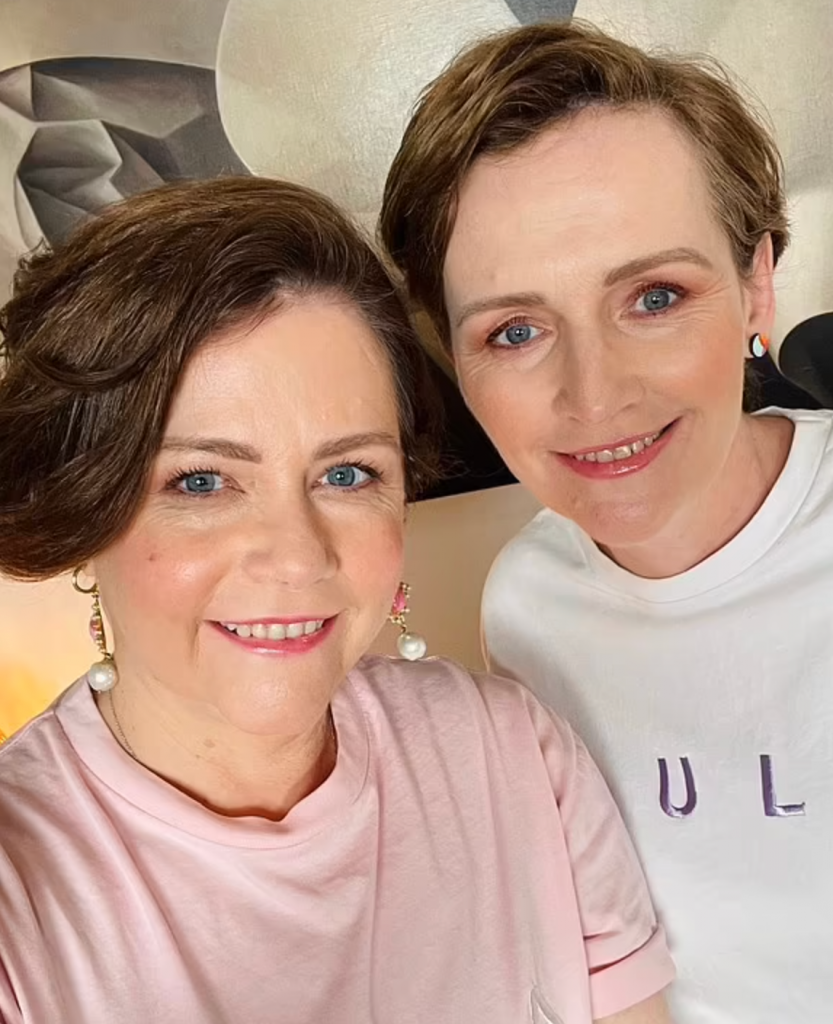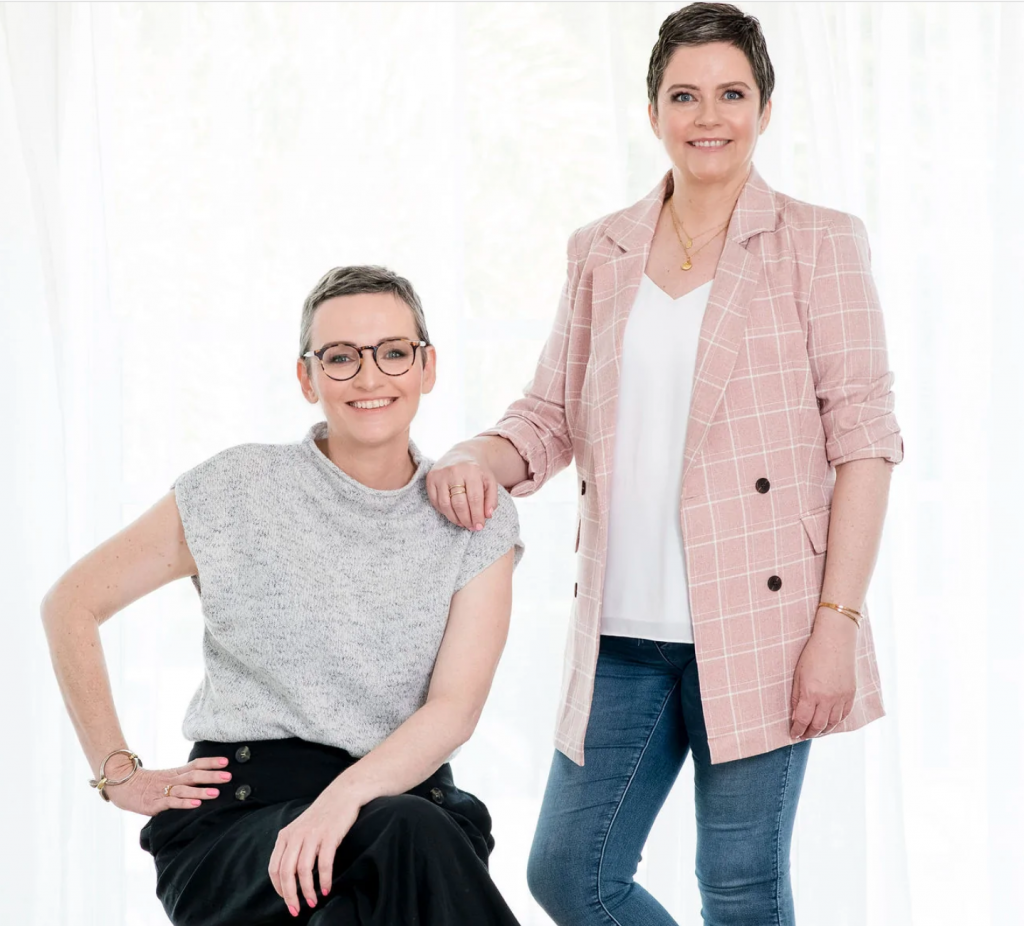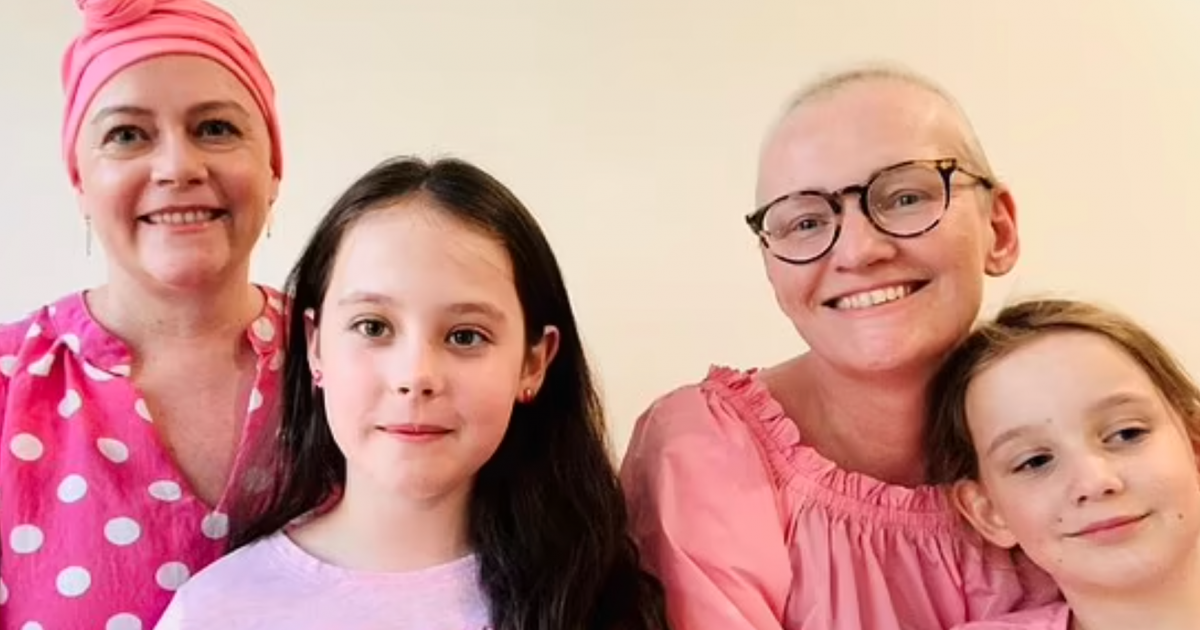Sisterhood of Survival
- Loving sisters Aisling and Margaret Cunningham, 50 and 46, were both diagnosed with breast cancer just six weeks apart in the summer of 2020.
- Margaret was diagnosed first, after noticing one breast was suddenly bigger than the other. Her sisters and mother immediately got checked, and Aisling then discovered she also had breast cancer.
- Talk to your doctor about genetic testing, and evaluate your risk today, whether or not you have a family history of breast cancer.
Margaret suddenly noticed that one breast was bigger than the other, and thankfully went right in to her doctor. After undergoing some tests, she found out she had lobular breast cancer, which is hormone-positive, and starts in the milk glands.
Read More“When Margaret was doing her chemotherapy I was having surgery and when I was doing my chemotherapy she had her surgery,” Aisling told the Daily Mail’s FEMAIL. “So we were able to be there for each other and be there for the kids.”

Unfortunately, Margaret had it particularly rough after her “intense chemotherapy” made her hips weak, which led to having to have both hips replaced.
The hip pain started during her treatment, and was officially diagnosed as avascular necrosis, but she says she was “so relieved it was something else and not cancer.”
Related: How to Cope With Bone Pain from Cancer
Doctors described drugs to strengthen her bones, but nevertheless, each hip collapsed.
“For eight weeks I couldn’t relax on a comfortable chair, drive or even dress myself,” she shared of the frustrating time. “I am just getting back to exercise now and finally after two years of medical appointments I am starting to feel okay, even normal,” she said.
Sadly, her children, who were age 7 and 11, had to help their mom dress.
Suffering through her own difficult recovery, Aisling underwent a double mastectomy and decided to have her ovaries removed. They are both looking forward to the holidays, as it will be their first Christmas without “medical-related complications.”
Looking forward to the future together, the survivor sisters are also happy to report that their self-warming eye mask business is booming, and they are both able to manage the business from the comfort of their own home.

“Mags was able to quit her job of 14 years and we now both work in the business full time,” Aisling said. “We do all of our work from home, moving from one house to the other,” she added.
Since they both understand the down days, where they not be as emotionally or physically active, they are able to “take up the slack if the other needs a break.”
The incredible support they have had from the breast cancer community has been endearing.
“We are so proud to be able to remind women to take a few moments for self care, without feeling guilty about it,” they said of their product. “Women do so much, self care is so important, whether you are sick or not.”
SurvivorNetTV Presents 'SOAR' Sisters Defying The Impossible
Breast Cancer in the Family
There are different types of genetic testing. There is testing for the DNA in our cells which shows what bad mutations we might have inherited or that could be passed along to our blood relatives. This testing for hereditary cancer risk requires your approval.
Then there is genetic testing of the tumor. This has been approved for payment by Medicare and has become standard practice, but does not require your approval.
Genetic Testing For Breast Cancer
For some patients, testing for a hereditary cause of cancer may be appropriate. This means determining whether you inherited an increased risk of cancer from your mother's or your father's side of the family. Your doctor will discuss your family history of cancer with you in the context of the type of tumor you have and your age at diagnosis. Hereditary genetic testing is usually done with a blood or saliva test.
The second test involves the genetic sequencing of your tumor. These genetic changes can be inherited but most arise during a person's lifetime. This process usually involves examining a biopsy or surgical specimen of your tumor. This testing can lead to decisions on drugs which might work against your cancer.
What is a BRCA Mutation?
What is a BRCA mutation? BRCA (a breast cancer gene mutation) is actually two genes (BRCA1 and BRCA2), each proteins that work as tumor suppressors. They help repair damaged DNA, and are important for ensuring the stability of each cell's genetic material.
When either of these genes is altered, that mutation can mean that its protein product does not function properly, or that damaged DNA may not be repaired correctly. These inherited mutations in BRCA1 and BRCA2 can increase the risk of female breast and ovarian cancers, and have also been associated with increased risks for several other cancers.
Dr. Rebecca Arend, Associate Scientist at the University of Alabama, Birmingham, explains the mutation in terms of its ability to repair damaged DNA.
"What a BRCA mutation is, is a defect in your ability to repair a double-strand break (in your DNA),” Dr. Arend tells SurvivorNet.
The BRCA mutation (which is passed on from a father or a mother), can cause a variety of cancers, including fallopian tube and peritoneal cancer, which are ovarian cancers.
“Furthermore, while about 1.3 percent of women in the general population will develop ovarian cancer sometime during their lives, it is estimated that about 44 percent of women who inherit a harmful BRCA1 mutation, and about 17 percent of women who inherit a harmful BRCA2 mutation, will develop ovarian cancer,” she explains of the significant risk for people who test positive for either mutation.
Related: Learning Your Options After Testing Positive for a BRCA Mutation
Dr. Elisa Port, Chief of Breast Surgery at Mount Sinai Health System, discussed what happens when you test positive for one of the BRCA mutations.
"Women who are found to test positive for a genetic mutation really have two options," Dr. Port explains to SurvivorNet. "One is what's called high-risk surveillance, which means we check them every six months or so mammograms, MRIs with the hope that if, God forbid, they develop breast cancer, we pick it up early. But that's not prevention, that's early detection.
"Early detection is a goal, it's not a guarantee. For the woman who wants to be more proactive about actually preventing breast cancer, or as we say reducing her risk, unfortunately, the only way to do that is to remove the actual tissue at risk and that is the breast tissue," she adds.
Margaret Cunningham’s family did the right thing to all get tested right away following her diagnosis. However, it would have been more optimal had they all gotten checked sooner. Talk to your doctor about genetic testing, and evaluate your risk today, whether or not you have a family history of breast cancer.
Learn more about SurvivorNet's rigorous medical review process.


